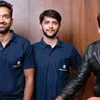Startup founders and doctors debunk myths as coronavirus cases spike
Doctors and healthcare startup founders speak to Shradha Sharma, Founder and CEO of YourStory, about the coronavirus pandemic, the problems doctors and healthcare workers are facing, and dos and don’ts in the time of COVID-19.
There seems to be no letup from the novel coronavirus. With over 1,604,000 cases and 95,735 deaths reported, COVID-19 has shaken the world up.
In India, which has a population of 1.3 billion, Prime Minister Narendra Modi announced a 21-day lockdown to help fight the spread of the disease. Despite that, the number of cases in the country has surged to over 6,000, with more than 200 deaths reported.
Governments, corporates, and startups have joined the fight against coronavirus. Numerous telemedicine platforms across India have stepped up to provide relevant information, diagnosis, and debunk myths.

In a webinar with Founder and CEO Shradha Sharma, Bengaluru doctors and healthcare professionals answered questions and addressed concerns on care and prevention amid coronavirus.
The speakers included Bhaskar Rajakumar, a doctor, Founder and CEO of professional medical education organisation Mediknit, and CTO of Aarogyaseva, a network of 50,000+ healthcare volunteers; Jagdish Chaturvedi, an ENT surgeon, medical device innovator, and standup comedian who has been active in sharing funny yet informative awareness videos on COVID-19; Manuj Garg, Founder of , and Aditya Kothari, the Co-founder and CEO of Plixr Technologies, and a member of Startups vs COVID-19 group.
Doctors, healthcare workers on the frontline
Even before coronavirus was declared a pandemic, doctors and healthcare workers on the frontline have been working hard to prevent the spread of COVID-19.
According to Bhaskar and Jagdish, they are the ones facing the brunt of the situation with limited or no available protective gear such as face masks, gowns, hazmat suits, ventilators, etc. While citizens bought masks in bulks from pharmacies to protect themselves, doctors and healthcare workers, who need it the most, have been deprived.
That’s not all. India still lacks an adequate number of hospitals and healthcare workers such as doctors, nurses, among others.
“We have a shortage of doctors, compared to our population. As per protocol, doctors have to stay at home for 14 days if they have any symptoms after being exposed to a patient. That is a loss of work for someone who can help a lot of patients. I just started a health plan service for patients from home, but all people who are joining are doctors,” Jagdish says.
According to doctors, everything seems under control at present. However, with a huge population and keeping in mind the rate at which COVID-19 cases rose exponentially in European countries, the “situation is scary”.
Healthcare workers are being trained to help with the rising number of cases. Various states have also been building hospitals with greater capacity on a war footing to accommodate patients.
At a press conference, Health Secretary Lav Agarwal said that the use of hydroxychloroquine, a drug used to treat malaria patients, is only for healthcare workers and doctors treating COVID-19 patients in hospitals.
However, with a plethora of information doing the rounds of social media and news, citizens have been also buying the drug for self-treatment.
“Even though the ICMR has set out a guideline of prophylaxis, the drug is meant to be used by healthcare providers, who are at an extremely high risk of contracting the disease. Some HIV drugs in combination with azithromycin also work. But, these drugs and the combinations have been tried based on what previous viruses have responded to,” Jagdish said.
“What people are missing out about the hydroxychloroquine drug is that the medicine is tested, but not approved by the government for consumption,” Aditya added.
What to do, what not to do
Jagdish said COVID-19 is a highly infectious virus but not as virulent as the SARS influenza strains that surfaced in the past. Therefore, a majority of the patients show mild to moderate symptoms. However, people with pre-existing conditions and the elderly are at high risk of contracting the disease, which could even prove fatal.
“A lot of coronavirus cases can be managed by effective home quarantine as most symptoms will pass in a matter of a few weeks,” Jagdish said.
Bhaskar said globally less than 20 percent of cases turned severe. With good immunity, severe cough can be treated. “Even if we see only four to five percent of patients getting into ICUs, we should be able to manage that, unless we don’t reach a very high number of positive cases. For that, we need to do social distancing, which we are doing right now, and maintain it so the numbers don’t spike,” he said.
Speaking about the transmission of the virus, Jagdish said a person cannot get infected by just touching things or surfaces. The transmission takes place “when a person touches something that may be infected and then touches his or her face”.
“It’s easier to focus on the part where transmission occurs rather than where you gain transmission. Because, your hand and face are in your control and the world outside is not. If you focus on that, you will be far safer in this situation than people who micromanage and control everything outside,” he said.
As a simple rule of thumb, the doctors reiterated the World Health Organisation’s guidelines on maintaining proper hygiene during coronavirus: washing hands regularly for 20 seconds, using an alcohol-based rub or sanitiser after touching a surface, and limit touching the face around eyes, nose, and mouth area.
Startups Vs COVID-19
An initiative started by Aditya, Co-founder and CEO of Plixr Technologies, along with four other startup founders, Startups Vs COVID-19 group is taking the fight to coronavirus. With people from all startup sectors, the group has a lot of creators, designers, and copywriters helping spread awareness on the deadly virus.
“The group also has a Google Drive link that lets companies and startups access the content and put it on their website to spread awareness,” Aditya said.
Aditya added that it was better to get the correct information from a doctor or government portal rather than believing WhatsApp forward messages.
Telemedicine: a way out
In these times when stepping out of the home is not advised, telemedicine has come as a boon.
MyUpchar is a healthcare and wellness startup that aims to solve the awareness and access problem in Tier II and III cities, and offers content in 12 languages.
According to Co-founder Manuj, the startup has about 10,000 doctors on its platform, and they been providing teleconsultations to patients. Helpline numbers are also available on the platform.
“We are trying to populate our resource page so people can find authentic doctor-based telemedicine portals. We have put out a list of COVID-19 startups and companies on a few platforms such as Startups vs COVID-19 and hiiih.in. There are about 10 telemedicine helplines on it,” Jagdish said.
He added that they were building a one-stop portal where people could access telemedicine, mask vendors, ventilator support, and other COVID-19 related services.
(Edited by Teja Lele Desai)










